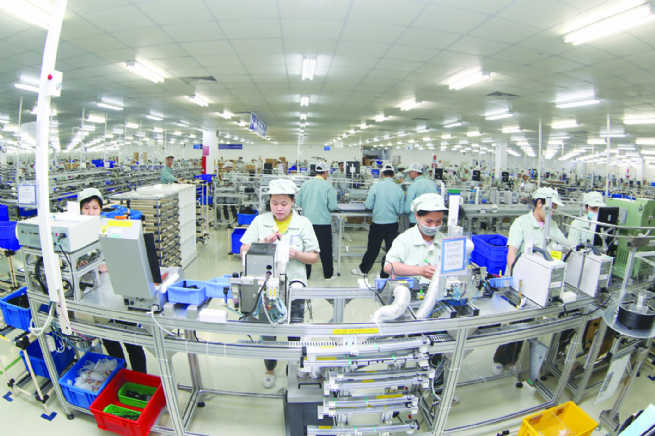Vietnam still a magnet for foreign investors
After 35 years of renovation and opening up, Vietnam has become one of the most successful countries in attracting foreign direct investment (FDI) in the region.
More big projects
According to the Foreign Investment Agency, Ministry of Planning and Investment, cumulatively up to now, there are 140 countries and territories investing in Vietnam. They have a total registered capital of US$349.9 billion in 33,463 projects. South Korea is the leading country pouring FDI into Vietnam, followed by Japan, Singapore, and Taiwan (China).

Illustrative photo
Notably, in 2020 and the first months of 2021, although still affected by the COVID-19 pandemic, FDI capital has been on the rise with many large projects, especially in the high-tech field. For example, LG Display Hai Phong increased capital by US$750 million; Jinko Solar PV Vietnam photovoltaic cell technology project added US$498 million; Intel, US$480 million; Foxconn, US$280 million. There are also some notable large projects such as the Long An LNG Power Plant Project I and II (Singapore), with a total registered capital of over US$3.1 billion; O Mon II Thermal Power Plant Project (Japan), with a total registered capital of over US$1.31 billion. This is a positive signal, consistent with the orientation of attracting large-scale FDI, focusing on quality rather than quantity.
More encouragingly, in addition to licensed projects, a series of other large FDI projects are set to enter Vietnam. Many investors are looking to Vietnam as a new destination in the context of global investment shifting.
According to Director of Foreign Investment Agency Do Nhat Hoang, the FDI sector increasingly asserts its role, position and great contributions to the country’s socio-economic development, actively contributing to the improvement of the economy and business environment; improve management capacity, corporate governance, support the reform of state-owned enterprises; improve the competitiveness of the economy. Up to now, the FDI sector accounts for about 25% of the total investment capital of the whole society and over 70% of the total export turnover of the country. In addition, the FDI sector has also contributed to increasing budget revenue, creating jobs, and stabilizing the social situation.
However, after more than three decades of attracting FDI, there are still shortcomings and limit ations that need to be overcome. The level of connectivity and spillover to the domestic investment sector has not been achieved as expected. Attracting and transferring technology from FDI sectors remains modest. Attracting FDI to a number of priority industries and fields and from multinational corporations is still limit ed. Some businesses do not seriously comply with regulations on environmental protection.
Proactive in FDI attraction
Investors are increasingly interested in Vietnam thanks to factors such as good disease control, stable macroeconomics, favorable business investment environment, and abundant human resources. Over the past years, Vietnam has actively attracted much quality investment. Vietnam also reviews the priorities and incentives for foreign enterprises. The Government has also established a Working Group to promote foreign investment cooperation to support multinational corporations and large foreign enterprises to promptly grasp investment cooperation opportunities in Vietnam. A series of important bills for investment and business activities have been promulgated; and special investment incentive mechanisms for large-scale projects added.
However, Director Do Nhat Hoang said that we should continue to promote strengths, potential and opportunities to attract more capital.
Accordingly, localities need to prepare input conditions for investment activities such as infrastructure, land, human resources, energy and institutional improvement. Only when there is an initiative in infrastructure, being quick in solving problems for investors, and actively removing bottlenecks in terms of mechanisms and procedures, will the country be able to convince "big investors". In addition to focusing on meeting the needs of investors, provinces and cities also need to be more proactive in project selection, aiming to support rapid and sustainable growth on the basis of suitability with the potential of the project and local capacity and orientation.
On the other hand, the fact that the supporting industry is weak is the reason why it is difficult for Vietnam to absorb FDI flows, especially linking to develop and participate more deeply in the value chain. According to Dr. Vu Tien Loc, President of Vietnam Chamber of Commerce and Industry (VCCI), Vietnam also needs a long-term policy in developing supporting industries. This is a necessary step to reduce the long-standing outsourcing situation in the manufacturing industry, and at the same time create higher added value.
Besides, according to many experts, in addition to focusing resources on controlling the COVID-19 pandemic, it is also necessary to actively develop a plan to "live with the pandemic". This helps businesses feel secure and ready to operate in all circumstances, without disrupting the supply chain.










